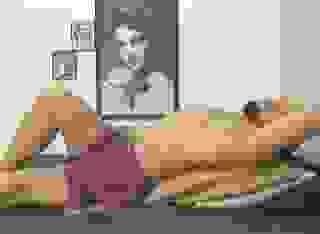- Gay Male
- Platres Conclave Ch. 01
Note: You can change font size, font face, and turn on dark mode by clicking the "A" icon tab in the Story Info Box.
You can temporarily switch back to a Classic Literotica® experience during our ongoing public Beta testing. Please consider leaving feedback on issues you experience or suggest improvements.
Click here(Note: This is a five-chapter novella, which should all post within three weeks of the posting of chapter one)
Who could have guessed that the sense of freedom and exhilaration could come in the form of a feeling of calm and of floating above the world and of experience and rejoicing in every moment? I had escaped—escaped Nicosia and the embassy and the American Center and all of the questioning—and judging—eyes. I was beyond the reach of Carolyn—of her antiseptic, instructional phone calls and, most of all, of who she was. The who that she was was diminishing the who that I was. But not today. Not on this mountain road up under the peak of Mount Olympus. Not in this classic Jaguar XKE I bought in defiance of my wife's admonition that the embassy standard was to buy Kias and, as she already was shipping the BMW, one of us should follow the standard.
The weather was fantastic—quite warm, the sun shining, as it almost always did in Cyprus—and the smell of the spring flowers and the filling out of the grape leaves in the vineyards on the sides of the slopes were transporting me to the world of "no worries." I put a Wes Montgomery CD in, the CD player being the only modern convenience that had been added to the green 1968 Vicarage XKE I'd fallen in love with on the dealer's lot on Grivas Avenue. I sat back into the soft leather seat, fully alert, not just to the road but to life to its fullest, and luxuriated in how well the ragtop held the curves as I climbed into the Troodos mountains, past Galata and Kakopetria, on my way to the Forest Park hotel in Pano Platres.
It had been both a brilliant and a desperate idea, I was thinking as I drove the winding road, to retreat to the mountains for two weeks before Carolyn descended. I had been pulling my hair out, harried at all sides, and tired of the constant looks I was getting in the embassy, everyone wondering how I fit in, how deeply I was going to intrude into their business and normally well-ordered community. The nonfunctional male spouse appendage of a woman of substance always raised questions that were both a nuisance and an invitation to worry about favoritism and the informal pecking order. These worries were natural, I knew, even though I didn't want to intrude at all. All I wanted to do was become invisible and write. Imagine my surprise and delight when not only could I get a reservation at the stately old British colonial mountain resort hotel, the Forest Park, but I could also book the room Daphne du Maurier had occupied while she was writing Rebecca. This was the best of all worlds.
I had come out to Cyprus two months ahead of Carolyn because she was still facing confirmation hearings in Washington, the lease was up on our New York apartment, and I fancied I'd be getting time to work on my new book. Thus far, though, I hadn't been able to write more than a couple of pages of prose, and I very much suspected those would have to be ripped out before I was finished. I couldn't concentrate in Nicosia.
First it was settling on a house, a process that wrung me dry as I played middleman between the embassy housing board and the persnickety Carolyn. She won out on all of her demands in the end, which, of course, I could have told the housing board she would before they even started the process. Then our shipment arrived, and it was a matter of making the house a home, combining what the embassy was providing and what Carolyn had sent. Carolyn had not sent any of my favorite furnishings, of course.
It wasn't much better at work. Even though I hadn't made such a request, A job had been found for me at the American Center—as an assistant director. This seemed natural, as I had gained a fair reputation as a novelist. But it wasn't a full-time job. Everyone I asked to apprise me of its duties could do little more than hem and haw and, in the end, could do no better than suggesting I'd be the artistic representative of the embassy, attending gallery openings and such—which I'd already be doing as the husband of the deputy chief of mission, the deputy U.S. ambassador. The more snide of the employees managed to let me know in indirect ways and looks that there really hadn't been a position before Carolyn was assigned to the mission and would be coming with a husband in tow. There was another assistant director of the American Center, and she handled the business and financial end and gave no indication she would be giving up any of her duties, DCM's husband or not.
So, that was me at the embassy—the informal cultural ambassador, "have scissors, will cut ribbons."
Everywhere I went while we were all waiting for Carolyn to make her entrance drew back a step from me and scrutinized me for signs of gigolo, aka useless appendage. Everyone knew Carolyn. And if they didn't like her, they did respect and fear her. She cut quite a swath in the State Department. This, while her first, was certainly to be her last DCM position. It would be ambassador after this. This was just a short training course for her to greater, more visible positions. If her own blonde beauty, dynamic personality, and driving ambition wouldn't see to that, her daddy, U.S. Senator Lawrence Grayson, certainly would.
It was natural that people would think that I had jumped on Carolyn Grayson's bandwagon for the cushy ride—and, yes, of course she kept her own name rather than taking mine. She was the dynamo and I was twenty years younger than she was and, in the eyes of many, of no substance and merely her trophy joystick. It didn't really matter that I'd had a couple of "almost" best-selling novels. What is a novelist anyway in the world of international affairs, if not just a nonfunctional dilettante—especially an eye-candy sort kept by a powerful woman as a well-dressed escort and nice cock to ride in bed?
It was nice, though, to be granted the "nice cock to ride" status. It did lead to some flirtatious moments with embassy secretaries.
And how much more dismissive would they have been of me, I wonder, if they knew that indictment now was only half true. Carolyn hadn't thrown me out of her life when she discovered the affair I was having with the poet, Richard Thornton, but she had insisted on separate bedrooms since then. She'd known I was bisexual when we'd married and it hadn't bothered her then, but I suppose she thought it some sort of defeat that she couldn't "straighten" me out completely and consume me all on her own—and Carolyn didn't like even the hint of defeat.
But neither the absent Carolyn nor the present staff of the American embassy in Nicosia could consume me now, today. With each of the ninety kilometers I was clicking off between Nicosia and Platres as I snaked around the climbing, winding mountain road in the luscious sports car my wife would give me hell for buying, the burdens of the reality of my life were slipping away and I was being lifted up in a cloud of calm exhilaration.
The Forest Park hotel was everything I had imagined and hoped it would be. Set high on a ridge in a deciduous forest, far different from most of the semiarid climate of the island of Cyprus, the Foreign Park was a slice in a much slower, more elegant, colonial period. It had been built in the 1930s in a community that had been an exclusive British colonial summer retreat for the governing officials when Cyprus was under British rule. Like such hill stations everywhere in the British Empire that were able to serve this purpose, the buildings here were of red-brick Victorian architecture. Nearly everything here was unlike almost anywhere else on the island—a very definite expression that here, if nowhere else, was a slice of England at the height of its power.
The hotel itself was several stories tall and sat on twenty acres of manicured hilltop property. Everything in the interior was set to an early time period too—to the 1980s, just before the British were forced off the island. The amenities were modern enough, but the veneer and the pace of life here was British colonialism at its height. And the service was white glove and impeccable, if slightly seedy—which I'd found also to be representative of that slice in time.
What first hit me as I entered the lobby was how quiet it was—and deserted. Someone stood behind the reception desk in stiff welcome, and a bellboy showed up instantaneously to take my suitcase, just as a car hop had materialized as soon as I'd driven into the tight forecourt circle and took the keys to my Jaguar. But if there were other guests, they were hiding behind the heavy brocade drapes against the wood-paneled walls on either side of each of the double doors into other parts of the hotel.
"It's low season here, sir," the receptionist provided by way of explanation. "Our high seasons now are summer, when the plains become unbearable, and winter when the ski slope is open up on Mount Olympus."
I thanked him in a hushed tone that mirrored his, which would have seemed strange in the deserted lobby if I were not in awe of the "back-in-times" elegant surroundings, and followed the bellboy to a small brass and black enamel elevator, which cranked its way up to the third floor.
The only thing that marked the room he took me to as that of Daphne du Marnier when she was writing Rebecca was a small brass plaque beside the door. As we had walked down the carpeted hall toward this room, I had notice several other such plaques beside doors, and I promised myself that I would explore and read them all as I had time.
Time. That seemed to be what I would have the most here at the Forest Park—and it was what I had sought. Quiet time to think and to write. To think about my life with Carolyn and where I fit into her life now, which seemed like not much at all. In New York I could be a person in my own right—have my own friends, pursue my own interests. Carolyn had been assigned to the U.S. delegation to the United Nations, and it had consumed her attention and time. We had even agreed that we would talk about the affair with Richard at some point—at the time she designated. But six months after she'd put a stop to the affair—via a telephone call to Richard from her senator father—we still hadn't found the time or opportunity to address the issue. Here in Cyprus, though, I was just that younger, dilettante unnecessary appendage of the deputy U.S. ambassador, a man living on whatever favor she gave me.
Most of all, though, I was here to write. In preparation for Carolyn's assignment to Cyprus, I had started to read about Cyprus and the Greeks and the Turks. As I often did, I approached the region in its poetry. Thus, I had found the Greek poet and diplomat George Seferis and had been taken by his laments of detachment from the things he loved. He had written much while in exile from Greece on the island of Crete during World War II. Reading of the recent history of Cyprus, I saw parallels where both Greeks and Turks were displaced from their home villages and still were prevented to return there.
I had written a book paralleling the life of the American novelist, Thomas Wolfe, who, after having written scathingly and tellingly about the society of the southern city of Asheville of his youth, felt both drawn to return there and repelled by the fear of how he would be received there. I added a dimension of alienation and danger in my novel. It had done very well in the market place.
It thus had come to my mind to write such a parallel novel to George Seferis's life and exile and meld in the feelings of isolation from one's own past that many in Cyprus must know. I had started the work in New York while I was engaged in a torrid affair with Richard Thornton. The loss of him had drained the creativity from me. I had looked forward to the change in venue to Cyprus to regain the creative juices. Thus far they had alluded me, however, in the minutia of preparing the way for Carolyn's arrival and of trying to convey to the embassy and American Center staff that I would draw on no favoritism if I possibly could help it. In truth, I knew Carolyn would show me no favoritism that wasn't connected with exhibiting my subordinate position in her life and world. This, I think, was her punishment for the affair with Richard.
The Du Maurier room was nothing special, certainly not a suite. But it did have a desk in one corner that probably symbolized her presence whether or not it was the actual desk she had put her typewriter on. I had read enough about her to know that she did use one to compose with. It would serve me just as well as some place to set my laptop. I vaguely wondered whether another novelist's muse could be captured as easily by a computer as by a Remington typewriter. There was even a chair I could use. Before unpacking, I tried out the desk and chair to see if it would be the right height and I found myself composing. I was writing more on the manuscript I had already tentatively titled "Sleep for the Nightingale" than I had written since the end of the affair with Richard. It seemed that muses didn't reject the march of technology.
Two hours later I realized that there was a stitch in my back from huddling over the laptop, and I stood and stretched and moved to the window.
The view from the window was down into the back garden, across a raised patio with tables—where I had been told breakfast would be served if the weather permitted. Beyond that, the grounds terraced away to a line of tall pines, a surprising and pleasant sight on a semiarid island. From this angle in a hollow beyond the breakfast terrace that would be shielded from view from the patio I saw a rectangular, midnight-blue bottomed swimming pool, surrounded by a stone deck. The short side of the pool was toward the hotel, with the diving board at the opposite end.
There was one lone swimmer. A man. He was swimming for exercise—or maybe to improve his diving form, which didn't seem to need any improvement. He appeared to be older than I was, but not by more than a few years. Dark haired and tall and well-muscled. He was probably one of those beautiful Greek Cypriot men I'd seen on the streets of Nicosia, a virtual Apollo before thirty but then starting a long, but steady decline into one of the shriveled, pot-bellied old men sitting and drinking ouzo at the sidewalk cafés throughout the day, ogling the young girls with toothless smiles as they passed on the street, and weaving stories with each other of "the good old days."
As I watched, I became aroused. I had been virtually celibate for six months now—since the affair with Richard, which had been torrid, with him taking any opportunity to come together, even in public places, and demanding that I fuck him twice or three times in quick succession and then for him to return the favor in one, long, languid coupling. In watching the man at the pool execute his perfect dives from the board and swim to the end of the pool and then return to the board to start the cycle all over again, I realized that I truly felt free for the first time in months. I was thinking of sex with a man. I had shrunk from any such thoughts in the face of Carolyn's judgmental frigidity toward me for months.
I opened my suitcase and felt around for my bathing suit and changed and descended to the lobby level and took the designated path to the outdoor pool. May in Cyprus was quite warm enough for those of us from more northern climes to swim. When I reached the pool, though, the man was gone. I told myself that this was quite all right with me, that he had only inserted in my brain the desire to take a swim myself.
I dove into the pool and did a quick ten laps and then came out and laid down on one of the pool beds and let the late afternoon sun, dappled here there the sighing pine trees bordering the swimming pool on three sides, dry me off. I'd brought one of George Seferis's poetry books with me and I read and drifted off into a pleasant near sleep.
When I became fully awake, I was still alone, the shadows were growing long, and it was turning a bit chilly. However I wasn't fully alone after all, I discovered, because when I looked up at the façade of the hotel, I saw that curtains were drawn from a window on the same floor my room was on and that there was a man standing at the window, naked, and looking down at the pool. I couldn't be sure, but I thought it might be the same man I'd seen swimming in the pool earlier. I could see that his body was magnificent, even from this distance, and I tensed up in arousal. I couldn't take my eyes off him until he withdrew from the window and pulled the drapes.
I remained there for another fifteen minutes, savoring the smell of the pines, the golden silence, and the solitude. I had been just as glad to be alone. While I had dozed, my mind had been racing on where I was in the manuscript. The call of the laptop drew me away from the pool, I padded back upstairs and sat back at the desk in my still-damp bathing suit and buried myself in my work. I trilled at the discovery that the muse hadn't left me, that my earlier, intense writing session hadn't been an anomaly.
The next time I became aware of anything but my writing, I was three thousand words to the good in a section of the book I was well satisfied with, and the only light in the room was the backlit computer screen.
I stood and stretched again, padded into the small, somewhat dated bathroom and showered, and went to the closet to pull my evening wear from the closet. I had come with semiformal dress, a black dinner jacket and pleated shirt and black bow tie. The hotel brochure had suggested it for the main dining room, and I didn't mind, because I knew I looked good in a dinner jacket. Carolyn was always careful to compliment me on my dress—as if this was her primary interest in me, and quite likely it was.
It was late when I descended to the ground level for dinner, and I was ravishingly hungry. But I also was well-pleased with myself. I had written five thousand words—every good words, I thought—on the manuscript and had devised a significant new subplot that hadn't occurred to me before.
I assumed I was the last diner when I arrived in the Blue Restaurant, the hotel's main dining room, as no other diners were present at 8:30 p.m. when I arrived. There were, however, eight or nine waiters standing at various stations in the room playing at "statue." As the time ticked on—service was impeccable but not particularly rapid, being set to European rather than American standards—I could hardly keep myself from laughing. Just me eating, surrounded by a battalion of waiting waiters—waiting for any sign that I needed something or had finished something. I would have felt extremely self-conscious except that my creative juices were still working and I entertained myself with thoughts of plots and subplots and turns of phrases.
I had finished a delicious dinner and was arising, with one waiter holding my chair and another brushing imaginary crumbs off my sleeves, when I no longer was the only guest in the dining room.
The handsome man from the swimming pool—I was sure that it was him—entered the dining room as I stood and was shown to a table across the room from where I was sitting. He looked entirely comfortable in the surroundings, and he looked fully as good in his evening wear as I fancied I did. He glanced at me in passing and gave me a slight smile and nod of his head, but he didn't break stride en route to his chair. He indeed was a handsome man. He could have been a movie star—which I later had occasion to recall and be amused by—and he was so well groomed that I thought that he must be a man of substance and importance. The waiters obviously were impressed by him.
I went back to the room and worked feverishly again on the manuscript until I felt exhausted—and profoundly thirsty. A room refrigerator was not likely to be something they would install at the Forest Park in the current century, so, still in my tux pants and pleated shirt, but minus tie and jacket and with the shirt comfortably open at the collar, I left the room again and went looking for the Olympus Bar, which the hotel brochure assured me was open until 3:00 a.m. It was almost midnight now. Still feeling the solitude of the hotel—not that I objected to that—I took up the George Seferis poetry book and a biography of him with the subtitle "Waiting for the Angel," and tucked them under my arm.








